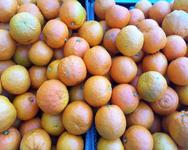Seville oranges (Bitters)
These oranges are not edible unless cooked.They are best used to make marmalade.Only available in January.They have a rough skin that is knobbly unlike normal oranges.
Origin: Spainish
Recommended Recipes
Orange marmalade.
Ingredients
6-8 smalloranges, weighing about 550g
juice of 1 lemons
1.4 litres water
1.1 kg granulated sugar.
Method
1. To sterilize jam jars, place them in a large saucepan and cover with cold water. Bring to the boil and simmer briskly for 10-15 minutes. Remove from the water with tongs and place upside down on a clean surface to dry.
2. Slice the oranges in half. Using a metal spoon, scoop out the flesh over a bowl to collect any juice, leaving the pith behind. Reserve the shells.
3. Put the flesh, juice and pips in a food processor and blend until smooth.
4. Push the purée through a sieve into a preserving pan or large heavy-based saucepan.
5. Now scoop out as much of the pith from the shells as possible. Slice the rind into very thin matchstick strips and add these to the sieved flesh in the pan.
6. Pour in the lemon juice and water.
7. Bring to the boil. Reduce the heat and simmer for 1 to 1 1/2 hours until the rind is very soft and the mixture has reduced by half.
8. Over a low heat, add the sugar and stir until it has dissolved. Boil for about 10 minutes, skimming off any froth on the surface.
9. After 10 minutes, spoon a little of the marmalade onto a cold plate and place in the fridge. If it sets to a jelly the marmalade is cooked. If necessary, cook for a further 5-10 minutes and test again.
10. Allow the marmalade to cool slightly, then pour into the sterilized jars.
Orange marmalade.
Ingredients
6-8 smalloranges, weighing about 550g
juice of 1 lemons
1.4 litres water
1.1 kg granulated sugar.
Method
1. To sterilize jam jars, place them in a large saucepan and cover with cold water. Bring to the boil and simmer briskly for 10-15 minutes. Remove from the water with tongs and place upside down on a clean surface to dry.
2. Slice the oranges in half. Using a metal spoon, scoop out the flesh over a bowl to collect any juice, leaving the pith behind. Reserve the shells.
3. Put the flesh, juice and pips in a food processor and blend until smooth.
4. Push the purée through a sieve into a preserving pan or large heavy-based saucepan.
5. Now scoop out as much of the pith from the shells as possible. Slice the rind into very thin matchstick strips and add these to the sieved flesh in the pan.
6. Pour in the lemon juice and water.
7. Bring to the boil. Reduce the heat and simmer for 1 to 1 1/2 hours until the rind is very soft and the mixture has reduced by half.
8. Over a low heat, add the sugar and stir until it has dissolved. Boil for about 10 minutes, skimming off any froth on the surface.
9. After 10 minutes, spoon a little of the marmalade onto a cold plate and place in the fridge. If it sets to a jelly the marmalade is cooked. If necessary, cook for a further 5-10 minutes and test again.
10. Allow the marmalade to cool slightly, then pour into the sterilized jars.



